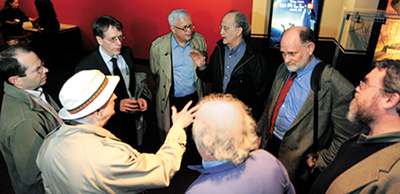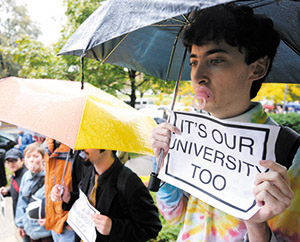What’s in a name?
By Amy Braverman Puma
Photography by Dan Dry
Even in death, former economics professor and Nobel laureate Milton Friedman, AM’33, can stir fresh controversy. Since the University announced in May that it would bestow Friedman’s name on a new institute devoted to path-breaking research in economics, business, and law, some professors have feared that the institute would link the University with the free-market economist’s libertarian politics. In June, 101 faculty members sent a letter to President Robert Zimmer outlining their concerns.
On October 15, reviving an annual tradition last observed in 1998, Zimmer and Provost Thomas Rosenbaum addressed a meeting of the full Faculty Senate. After state-of-the-University reports from the president and the provost, the bulk of the meeting was given over to a discussion of the Milton Friedman Institute, which formally launched in July with plans to move into the Chicago Theological Seminary building on 58th Street in 2012, when the seminary moves to a new Hyde Park location.
 Becker, in the hat, chats with (clockwise) public-policy professor Meyer, economists Hansen and Heckman, historian Postone, Lincoln, and anthropologists Kelly and Sahlins.
Becker, in the hat, chats with (clockwise) public-policy professor Meyer, economists Hansen and Heckman, historian Postone, Lincoln, and anthropologists Kelly and Sahlins. In the weeks before the meeting, the campus controversy heightened as the global economic crisis dominated the news. Some academics blame Friedman’s anti-regulation views for the market’s woes. The economist, who taught at Chicago from 1946 to 1976, won the 1976 economics Nobel for research on consumption analysis, monetary history and theory, and for demonstrating the complexity of stabilization policy. But many remember Friedman, who died in 2006, as a public intellectual and policy adviser who influenced President Reagan and other leaders on the value of free markets.
The day of the Faculty Senate meeting, about 70 student protesters gathered on the rain-soaked quads and marched from the center circle to Ida Noyes Hall, where they passed out flowers to entering faculty members, sucked pacifiers to signify the University saw but didn’t really hear them, and held signs that read, “Will we all become ‘Chicago boys’?” and “Students for Ideological Stubbornness.”
Senate meetings are traditionally closed to nonmembers, and the media waited outside for a post-meeting report. The 200-plus faculty members who attended (of 1,200 faculty with Senate membership) included academic heavyweights: afterward history of religions professor Bruce Lincoln, a cochair of the anti-institute faculty group CORES (Committee for Open Research on Economy and Society), huddled in the lobby with economics Nobelists Gary Becker, AM’53, PhD’55, and James Heckman; economist Lars Hansen; anthropologists Marshall Sahlins and John Kelly; historian Moishe Postone, SB’63, AM’67; and public-policy professor Bruce Meyer.
The meeting was “calm and collected,” social-sciences dean Mark Hansen told the Chronicle of Higher Education. “It was the kind of discussion that one expects from mature adults who are very smart.” Lincoln told the Magazine that Rosenbaum called on an equal number of speakers for and against the institute, noting that supporters came mostly from economics and business, while those opposed represented a wide range of disciplines.
In his own address, published on the CORES Web site, Lincoln noted that Friedman advised conservative world leaders including not only Reagan and Margaret Thatcher but also Chilean dictator Augusto Pinochet and China’s Deng Hsiao-Ping, arguing that “Friedman’s politics were inextricable from his economics, and vice versa.”
Yet Dean Hansen, who supports the institute, disagreed, arguing that it is a place for vigorous research, intended as “a destination for great work in economics, a center for economic thought,” in much the same way that the Institute for Advanced Study in Princeton, New Jersey, is a destination for physicists and mathematicians worldwide.
Answering concerns that the institute would espouse exclusively conservative ideas, the dean said after the meeting, “This is an economics-research institute that carries on Friedman’s example of great scholarship, not a shrine.” Academics routinely “do research and take stands that are controversial,” he said. “But the views they express and the conclusions they draw from that research are their own. The University neither endorses nor renounces those views.”
 Students outside Ida Noyes protested silently to signal the administration wasn’t hearing their objections.
Students outside Ida Noyes protested silently to signal the administration wasn’t hearing their objections. The institute is named for Friedman, Hansen said, “in recognition of his contribution as a 30-plus-year member of the University of Chicago faculty who had an enormous impact in the discipline of economics” and whose “ideas are now part of mainstream economic thought.” Friedman was also, Hansen added by way of demonstration, “recognized by all our Chicago economists as one of the greatest of the greats.”
The University has honored other seminal scholars, opening the Fermi and Franck institutes and the Marty and Katz centers. Chicago “has a wide range of centers, none of which draws on the entire faculty,” Hansen said, and that diversity “makes us a better university.”
Some Senate members raised concerns that donors to the Friedman Institute—it’s a $200 million enterprise, about half to start an endowment and the rest for start-up costs, most of which will be raised in private donations—would lean toward conservative politics, skewing the research done there. Hansen called the worries baseless. “We have a long history of being clear that donors don’t get to call the shots, don’t get to influence the direction” of any University center or institute. “The faculty and administrators will set the direction.”
And to the charge that Friedman’s deregulation ideas led to the current economic meltdown, Hansen responded, “How do you know?” The crisis is new, and economists “haven’t done the research yet to state that conclusion with any confidence.” The Milton Friedman Institute, he said, “is just such a place where such research will be done.”
Hansen believed that the Faculty Senate session helped quell some fears. About two weeks afterward, Rosenbaum sent a letter to faculty, reiterating that the institute “is not a think tank and it is not designed to subscribe to or foster any particular political viewpoints.” He also announced that in response to some faculty members’ request, the administration had augmented the institute’s name for clarity: it’s now the Milton Friedman Institute for Research in Economics.
Before Rosenbaum sent this letter, CORES, cochaired by computer-science professor Yali Amit, had gathered enough signatures—more than the ten percent of Faculty Senate members required—to prompt a second meeting. Lincoln expressed disappointment with the Senate meeting because a vote was not permitted. Although traditionally it’s the elected Council of the Faculty Senate that votes on resolutions, in 1986 President Hanna H. Gray allowed a nonbinding vote by the Faculty Senate on a resolution to divest University funds from South Africa. The resolution was defeated.
By late October CORES hadn’t yet met to discuss the addition of “for research in economics” to the institute’s name and whether the group would still push for a second meeting. The change wasn’t a CORES suggestion, but “it’s of the sort” the group had proposed as a “minimal” concession, Lincoln said. Although he’d like to see Friedman’s name taken off entirely, the change shows that administrators have “heard some of the things we’ve said.” He wished “it had been a more consultative and negotiative process,” he added, but “it’s progress.”—A.B.P
Return to top